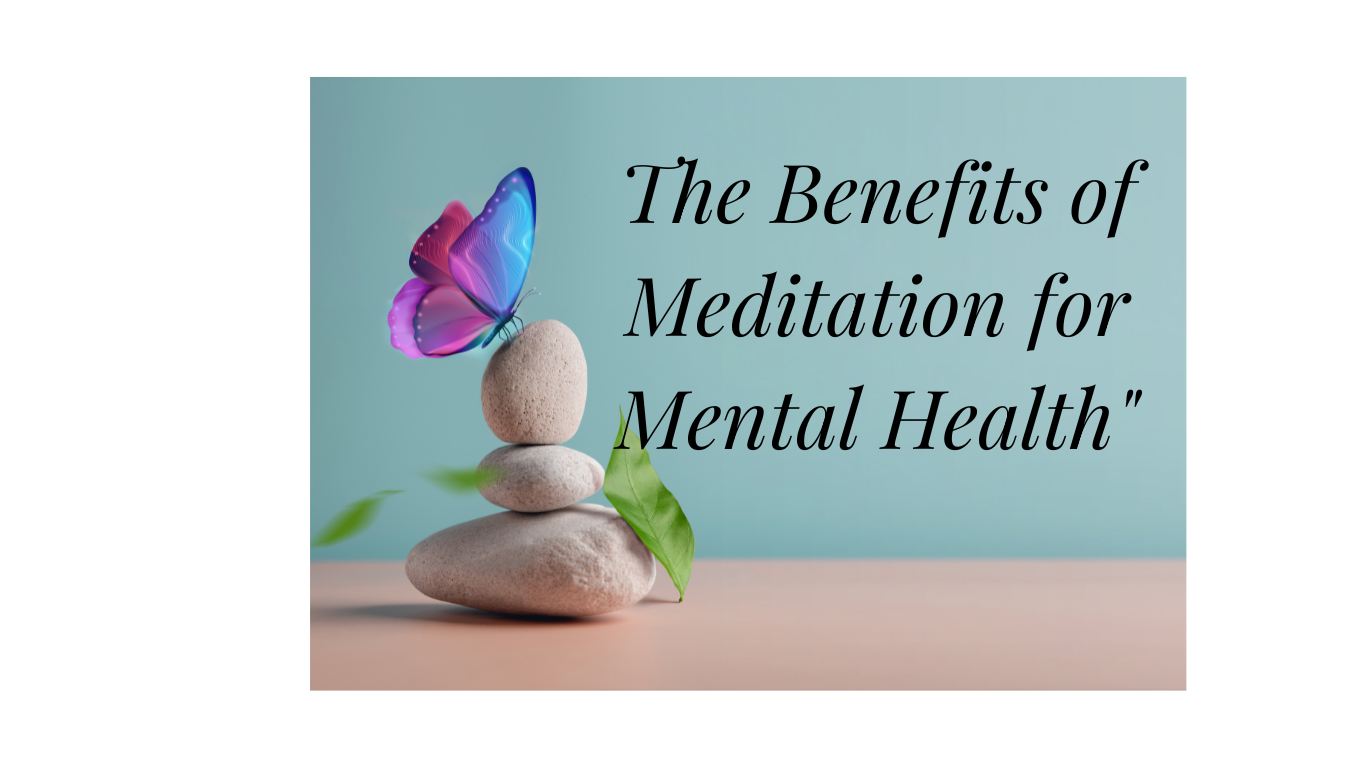‘The Benefits of Meditation for Mental Health”
Meditation has been widely recognized for its positive impact on mental health.https://royalsscentdrop.com/
Here are some key benefits:
1. Reduces Stress
- Stress Reduction: One of the most well-documented benefits of meditation is its ability to reduce stress. Mindfulness meditation, in particular, has been shown to lower levels of cortisol, the stress hormone, thus helping people manage stress better.
2. Enhances Emotional Health
- Improves Mood: Regular meditation practice can lead to an improved mood and a more positive outlook on life. It can help reduce symptoms of depression and anxiety.
- Increases Emotional Regulation: Meditation helps in regulating emotions by promoting mindfulness and a non-reactive state of mind.
3. Improves Focus and Concentration
- Boosts Attention Span: Meditation practices like focused-attention meditation improve the ability to concentrate and maintain attention over prolonged periods.
- Enhances Memory: Regular meditation practice is linked to improved memory and cognitive function.
4. Promotes Self-Awareness
- Increases Self-Understanding: Meditation helps increase self-awareness, enabling individuals to gain a better understanding of themselves and their actions.
- Encourages Healthy Habits: This self-awareness can lead to healthier lifestyle choices and better habits.
5. Reduces Symptoms of Anxiety and Depression
- Decreases Anxiety: Various forms of meditation, such as mindfulness and loving-kindness meditation, can reduce symptoms of anxiety disorders.
- Combats Depression: Meditation can help in reducing the recurrence of depressive episodes, often used as a complementary therapy in depression treatment.
6. Enhances Sleep Quality
- Improves Sleep: Meditation can help improve sleep quality by promoting relaxation and reducing the symptoms of insomnia.
- Reduces Sleep Disorders: It can be effective in treating sleep disorders by improving overall sleep patterns.
7. Promotes Overall Well-being
- Increases Resilience: Meditation enhances resilience, enabling individuals to better cope with life’s challenges and bounce back from adversity.
- Fosters a Sense of Calm: It cultivates a sense of inner peace and calm, contributing to overall well-being.
8. Supports Physical Health
- Lowers Blood Pressure: Meditation can help lower blood pressure, reducing the risk of cardiovascular diseases.
- Boosts Immune System: It may also enhance the immune system, helping the body to fight off illnesses more effectively.

Mindfulness and meditation are powerful tools for enhancing mental wellbeing. Here’s an in-depth look at how they contribute to mental health:
Understanding Mindfulness and Meditation
- Mindfulness: It involves paying deliberate attention to the present moment without judgment. It encourages awareness of thoughts, feelings, and bodily sensations.
- Meditation: A practice that involves techniques to focus the mind and achieve a state of relaxation and heightened awareness. There are various forms of meditation, including mindfulness meditation, loving-kindness meditation, and transcendental meditation.
Benefits of Mindfulness and Meditation
1. Reducing Stress and Anxiety
- Stress Reduction: Both mindfulness and meditation significantly reduce stress by promoting relaxation and reducing the production of stress hormones like cortisol.
- Anxiety Management: These practices help in managing anxiety by encouraging a focus on the present moment, reducing worry about the future or rumination on the past.
2. Improving Emotional Health
- Enhanced Emotional Regulation: Mindfulness and meditation improve emotional regulation, helping individuals respond to situations more calmly and thoughtfully.
- Mood Improvement: Regular practice can lead to a more positive outlook on life and a reduction in symptoms of depression.
3. Boosting Cognitive Functions
- Improved Concentration and Focus: Mindfulness meditation enhances attention span and the ability to concentrate, which is beneficial in both personal and professional settings.
- Better Memory: These practices have been shown to improve memory and cognitive function, aiding in better information retention and recall.
4. Enhancing Self-Awareness
- Greater Self-Understanding: Mindfulness fosters a deeper understanding of oneself, encouraging personal growth and self-acceptance.
- Behavioral Changes: Increased self-awareness can lead to positive behavioral changes and healthier lifestyle choices.
5. Promoting Better Sleep
- Improved Sleep Quality: Meditation can help improve sleep patterns by reducing insomnia and promoting relaxation.
- Sleep Disorders Management: Mindfulness practices can be effective in managing sleep disorders and enhancing overall sleep quality.
6. Supporting Physical Health
- Lowering Blood Pressure: Mindfulness and meditation practices help lower blood pressure, reducing the risk of heart-related issues.
- Boosting Immunity: These practices can enhance immune function, helping the body fight off illnesses more effectively.
7. Fostering Overall Wellbeing
- Increased Resilience: Regular mindfulness and meditation practices build resilience, enabling better coping with life’s challenges.
- Sense of Calm and Peace: These practices cultivate a sense of inner calm and peace, contributing to overall mental wellbeing.
Practical Tips for Incorporating Mindfulness and Meditation
- Start Small: Begin with short sessions, gradually increasing the duration as you become more comfortable with the practice.
- Create a Routine: Set aside a specific time each day for mindfulness and meditation to make it a regular habit.
- Use Guided Sessions: Utilize apps or online resources for guided meditation and mindfulness sessions, especially if you are a beginner.
- Practice Mindfulness Throughout the Day: Incorporate mindfulness into daily activities such as eating, walking, or even doing household chores by staying present and fully engaged in the moment.

Meditation for Stress Relief
Meditation is a highly effective tool for managing and reducing stress. Here’s how it works and its benefits:
How Meditation Reduces Stress
- Relaxation Response: Meditation triggers the body’s relaxation response, which counteracts the stress response. This leads to a decrease in heart rate, blood pressure, and muscle tension.
- Mindfulness and Awareness: By focusing on the present moment, meditation helps reduce worries about the future and regrets about the past, which are major sources of stress.
- Breathing Techniques: Many meditation practices incorporate deep breathing, which helps calm the nervous system and reduces the physiological symptoms of stress.
Benefits of Meditation for Stress Relief
- Lower Cortisol Levels: Regular meditation can reduce the production of cortisol, the body’s main stress hormone.
- Improved Emotional Regulation: Meditation helps manage emotions more effectively, reducing the impact of stressors.
- Enhanced Resilience: It builds resilience, helping individuals cope better with stressful situations.
Types of Meditation for Stress Relief
- Mindfulness Meditation: Focuses on being present and fully engaged with the moment.
- Loving-Kindness Meditation: Involves sending positive thoughts to oneself and others, fostering a sense of peace and well-being.
- Body Scan Meditation: Involves paying attention to different parts of the body, releasing tension and promoting relaxation.
Calming the Mind and Body
Calming the mind and body through meditation can significantly improve overall wellbeing. Here’s how:
Techniques to Calm the Mind and Body
- Deep Breathing: Simple breathing exercises, such as deep belly breathing, can quickly calm the mind and body.
- Progressive Muscle Relaxation: This involves tensing and then slowly releasing each muscle group in the body, reducing physical tension.
- Guided Imagery: Visualization techniques involve imagining a peaceful scene or place, which can help relax the mind and body.
Benefits of a Calm Mind and Body
- Reduced Anxiety: A calm mind can better handle anxiety-provoking situations, reducing overall anxiety levels.
- Improved Sleep: Calming practices before bedtime can improve sleep quality and reduce insomnia.
- Enhanced Focus and Clarity: A calm mind is more focused and clear, leading to better decision-making and productivity.
Daily Practices for Calmness
- Mindful Breathing: Take a few minutes each day to focus solely on your breath, helping to center and calm your mind.
- Meditation Apps: Utilize apps that offer guided meditations specifically designed to promote calmness and relaxation.
- Nature Walks: Spending time in nature and practicing mindfulness during a walk can be very soothing for the mind and body.
Reducing Anxiety Through Mindfulness
Mindfulness is a powerful practice for reducing anxiety. Here’s how it helps and how to practice it:
How Mindfulness Reduces Anxiety
- Present Moment Awareness: Mindfulness encourages focusing on the present moment, which helps reduce worrying about the future or dwelling on the past.
- Non-Judgmental Observation: It promotes observing thoughts and feelings without judgment, reducing the impact of negative thinking patterns that contribute to anxiety.
- Acceptance: Mindfulness fosters acceptance of thoughts and feelings, which can reduce the struggle and resistance that often exacerbate anxiety.
Benefits of Mindfulness for Anxiety
- Improved Emotional Regulation: Mindfulness helps regulate emotions, making it easier to manage anxious feelings.
- Reduced Rumination: By focusing on the present, mindfulness reduces the tendency to ruminate on anxious thoughts.
- Enhanced Relaxation: Mindfulness practices promote relaxation and calmness, reducing overall anxiety levels.
Mindfulness Practices for Reducing Anxiety
- Mindful Breathing: Focus on your breath, noticing each inhale and exhale. This simple practice can be done anywhere and helps center your mind.
- Body Scan Meditation: Pay attention to different parts of your body, releasing tension and promoting relaxation.
- Mindful Walking: Practice mindfulness while walking by paying attention to the sensation of your feet touching the ground, the movement of your body, and the surrounding environment.

Meditation for Mental Health and Wellbeing
Meditation is a valuable practice for enhancing mental health and overall wellbeing. Here’s how it contributes to these areas:
Benefits of Meditation for Mental Health
- Reduces Stress: Meditation activates the body’s relaxation response, reducing the production of stress hormones and alleviating stress.
- Alleviates Anxiety and Depression: Regular meditation practice has been shown to reduce symptoms of anxiety and depression by promoting a calm and balanced state of mind.
- Improves Emotional Health: Meditation helps regulate emotions, leading to greater emotional stability and a more positive outlook on life.
- Enhances Focus and Cognitive Function: It improves concentration, memory, and cognitive functions, aiding in better decision-making and problem-solving skills.
Types of Meditation for Mental Health
- Mindfulness Meditation: Focuses on being present and fully engaged with the moment.
- Loving-Kindness Meditation: Encourages sending positive thoughts to oneself and others, fostering compassion and empathy.
- Transcendental Meditation: Involves the use of a mantra to achieve a deep state of relaxation and heightened awareness.
Incorporating Mindfulness into Daily Life
Mindfulness can be seamlessly integrated into daily routines to enhance mental and emotional wellbeing. Here are practical ways to do so:
Daily Mindfulness Practices
- Mindful Breathing: Take a few moments throughout the day to focus on your breath. Pay attention to each inhale and exhale, which can help center and calm your mind.
- Mindful Eating: Eat meals without distractions, savoring each bite and paying attention to the flavors, textures, and sensations.
- Mindful Walking: Practice mindfulness while walking by focusing on the sensations in your feet and legs, the rhythm of your steps, and your surroundings.
- Mindful Listening: Engage fully in conversations, listening attentively without planning your response while the other person is speaking.
Tips for Integrating Mindfulness
- Set Reminders: Use reminders on your phone or sticky notes in your environment to prompt you to practice mindfulness throughout the day.
- Create Mindful Rituals: Incorporate mindfulness into daily activities, such as morning coffee or evening relaxation, by being fully present in the moment.
- Start Small: Begin with short mindfulness practices and gradually increase the duration as you become more comfortable.
Finding Peace Through Meditation
Meditation is a powerful practice for finding inner peace and achieving a sense of calm and tranquility. Here’s how:
How Meditation Brings Peace
- Promotes Relaxation: Meditation helps relax the body and mind, reducing tension and promoting a peaceful state.
- Encourages Presence: By focusing on the present moment, meditation reduces worries about the future and regrets about the past, fostering a sense of peace.
- Cultivates Acceptance: Meditation encourages acceptance of thoughts and feelings without judgment, leading to a more peaceful and balanced mindset.
Practices for Finding Peace
- Guided Meditation: Use guided meditation sessions to help focus your mind and achieve a state of relaxation and peace.
- Body Scan Meditation: Practice body scan meditation to release tension and promote relaxation by focusing on different parts of your body.
- Loving-Kindness Meditation: Send positive thoughts to yourself and others, cultivating compassion and a sense of inner peace.
Creating a Peaceful Environment
- Quiet Space: Designate a quiet space in your home for meditation, free from distractions.
- Comfortable Seating: Ensure you have a comfortable place to sit or lie down during meditation to help you relax fully.
- Regular Practice: Make meditation a regular part of your routine to consistently experience its calming benefits.
Meditation and mindfulness are powerful practices for enhancing mental health, incorporating peace into daily life, and achieving overall wellbeing. By integrating these practices into your daily routine, you can reduce stress, alleviate anxiety, and find a greater sense of inner peace and balance. Whether through mindful breathing, eating, or dedicated meditation sessions, these practices offer accessible and effective ways to improve your quality of life.

